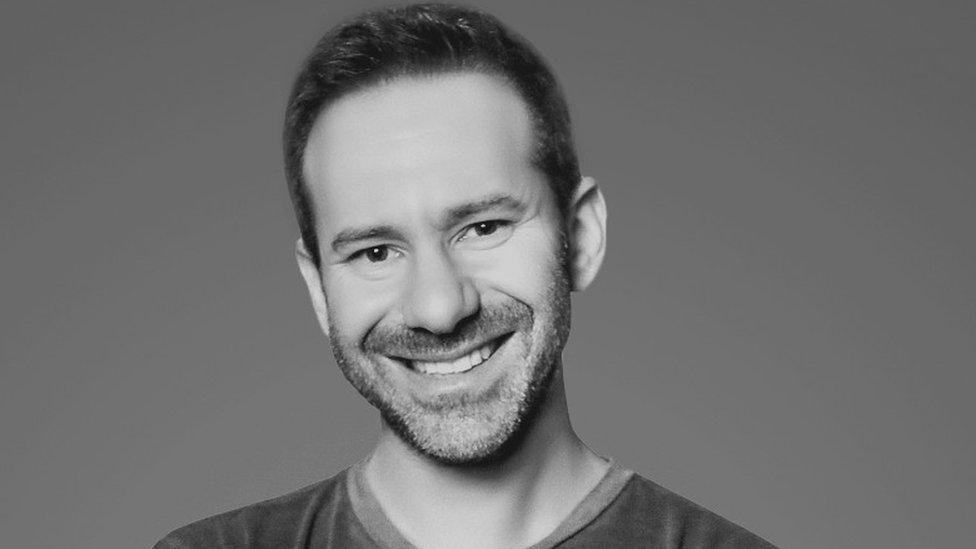OnlyFans: Who is Leonid Radvinsky, the elusive owner of a porn empire?
- Published

OnlyFans' profits have skyrocketed in the past year and news that its owner earned more than $300m (£238m) in dividends has ignited fresh questions about the pornography mogul.
Leonid Radvinsky is a 41-year-old Ukrainian-American entrepreneur with an estimated net worth of $2.1bn.
He bought the company in 2018 from father and son team, Guy and Tim Stokely, who had started it two years earlier with a £10,000 ($12,500) investment.
He's thought to have paid millions of pounds for it. But who is he, and where has his money come from?
What do we know about him?
To put it bluntly, very little. Despite the premise of the platform he owns, Mr Radvinsky chooses to keep his personal life private. He has not given many interviews.
Yet despite an apparent aversion to publicity, there are hints about his life on a LinkedIn profile and a personal website.
According to his LinkedIn, Mr Radvinsky is a venture capital investor, philanthropist and technology entrepreneur who has "a special interest in emerging social media platforms".
On his own website, Mr Radvinsky says he has spent the last two decades "building software companies and contributing to the open source movement".
Born in the Ukrainian port city of Odesa, Mr Radvinsky's company donated to the relief effort in Ukraine using cryptocurrency, and the real-terms value of the donation in 2022 came to more than $1.3m, according to CoinDesk., external
Mr Radvinsky says he donates "a huge amount of time, effort and money to non-profit causes," like charities and technological endeavours.
Outside of programming and philanthropy, he "is an avid reader who's always ready for a chess match and is an aspiring helicopter pilot," his website says.
Where does he live?
His family moved to the United States when he was a child and they settled in Chicago, the Daily Telegraph reported. He now lives in "sunny Florida" but we do not know exactly where.
The billionaire is described by Forbes as a married man, but the BBC has been unable to verify the identity of his spouse.
Business history
OnlyFans is not Mr Radvinsky's first business linked to the pornography industry.
Mr Radvinsky studied economics at Northwestern University, near Chicago, Illinois, and graduated in 2002. Since then, the entrepreneur has delved into several projects.
Prior to becoming the sole shareholder of OnlyFans' parent company, Fenix, he founded a website referral business called Cybertania.
According to Forbes, external, the business offered users links to passwords for content, including pornography, beginning in the late 1990s.
Before stepping in to buy OnlyFans, he also owned a successful adult webcam business.
Mr Radvinsky did not respond to a BBC request for interview.
What is the company behind OnlyFans?
Fenix, the business that owns OnlyFans, is still registered in the UK despite Mr Radvinsky being based in the US.
But the company's chief financial officer, Lee Taylor, is based in the UK, according to Companies House records.
Public records show investor and founder Guy Stokely resigned from OnlyFans' parent company, Fenix, in December 2021.
In the same month, Tim Stokely, Guy's son, stepped down as OnlyFans' chief executive to "pursue new endeavours".
Under Mr Radvinsky's ownership, OnlyFans has flourished. It is no longer solely associated with pornography and some of its biggest creators only post safe-for-work content.
How much money does OnlyFans make?
The London-registered firm said in August 2023 that pre-tax profits for the period reached $525m, up from $432m the previous year.
In the past year alone the number of creators on OnlyFans jumped by 47% to almost 3.2 million, while the number of users rose by 27% to close to 239 million.
But the platform has also faced criticism and renewed attention from regulators and governments.
BBC News reported in 2021 that OnlyFans was failing to prevent underage users from selling and appearing in explicit videos.
OnlyFans said at the time that its age verification systems went over and above regulatory requirements.
Related topics
- Published27 May 2021

- Published27 October 2022

- Published9 August 2022

- Published25 August 2023
